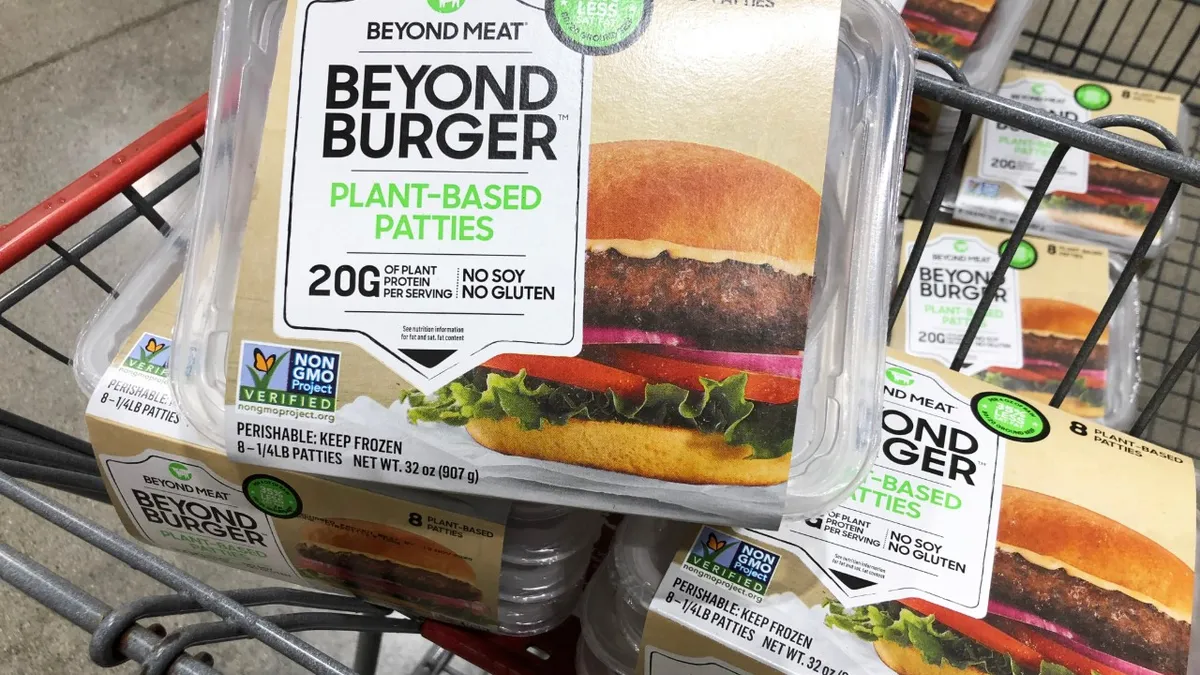Dive Brief:
- Beyond Meat will now sell 8-packs of its plant-based Beyond Burger patties at BJ's Wholesale and Sam's Clubs nationwide, the company announced on Monday. This expansion brings Beyond Meat to the three major warehouse club stores in the U.S. The company started selling the Beyond Burger in Costco stores in 2019.
- Impossible Foods also is expanding its retail footprint. On Monday, the company said it is making its debut in the Southeast at all 1,252 Publix stores. Last week, the plant-based burger maker announced it would be available at 2,100 Walmart locations nationwide. Trader Joe's also said in late July that the Impossible Burger will be sold at its stores.
- Beyond Meat's products are currently available at about 25,000 retail stores nationwide, according to the plant-based food manufacturer. Consumers can find Impossible Foods' items at about 9,200 grocery stores, the company said.
Dive Insight:
As 2020 has become a year dominated by the coronavirus pandemic, there are many staple items that have been at times difficult to find in grocery stores.
In contrast, plant-based meat has become much easier to purchase. This is due to the fact that plant-based products are now almost everywhere. The retail ramp-up planned for this year does not appear to have slowed because of the pandemic and in many cases has accelerated.
In the last six months, Impossible Foods — a plant-based giant that concentrated on becoming established in restaurants before retail — has expanded its grocery store footprint by more than 60 times, the company said in its release about the Publix launch. In early March, it was in 150 locations. Now, it is in more than 6,000 stores after accelerating its rollout following a surge in demand from consumers and interest from grocery chains.
Beyond Meat took the opposite path — first becoming established in retail stores and then moving to restaurants — so it's a brand that consumers are accustomed to seeing in freezer cases. In the release about the BJ's and Sam's Club launches, Beyond Meat said it is the top-selling refrigerated plant-based meat brand and owns the top four SKUs in the segment, according to SPINS data for the four weeks ended June 15.
But while Beyond Meat and Impossible Foods can tout their progress and standing in the plant-based meat segment, that doesn't address what both companies have said their real competition is going forward. Rachel Konrad, Impossible Foods' chief communications officer, said this spring the company's goal for 2020 was to be everywhere that ground beef is sold.
"Our real competition is, in fact, the $1.4 trillion [animal-derived meat] category," Chuck Muth, Beyond Meat's chief growth officer, said in an interview last year.
Impossible Foods and Beyond Meat are the two most prominent in the segment today, but it also includes Big Food-owned stalwart brands like Conagra Brands' Gardein and relative newcomers like Nestlé's Sweet Earth and Tyson Foods' Raised & Rooted. It also includes private label brands, which augment the offerings at many major grocery stores today. As a result, most stores have at least one plant-based meat option, if not several.
Plant-based foods have drawn some criticism that they are highly processed, high in sodium and fat and not as good for the environment as they claim.
But that hasn't slowed the pace of growth. Plant-based meat sales in 2019 were worth more than $939 million, according to SPINS statistics analyzed by the Good Food Institute. The pandemic has accelerated this growth, with sales of all plant-based meats up 148% compared to last year, according to SPINS statistics looking at sales through April 19. In the four months that ended June 20, refrigerated plant-based meat sales rose 218.6%, according to Nielsen statistics emailed to Food Dive.
Plant-based meat may look and taste similar to the real thing, but it's manufactured in a way that is high on technology and low on close person-to-person contact. Many traditional meat plants, where workers stand close together, have been coronavirus hotspots, leading to closures and meat shortages. Plant-based meat has stayed plentiful and factories have continued to produce at their normal outputs. For now, plant-based meats appear to have a strong runway ahead for growth, but they will be under pressure to continue producing more meat-like options that taste even closer to the real thing while continuing to get more stores to carry their products.














